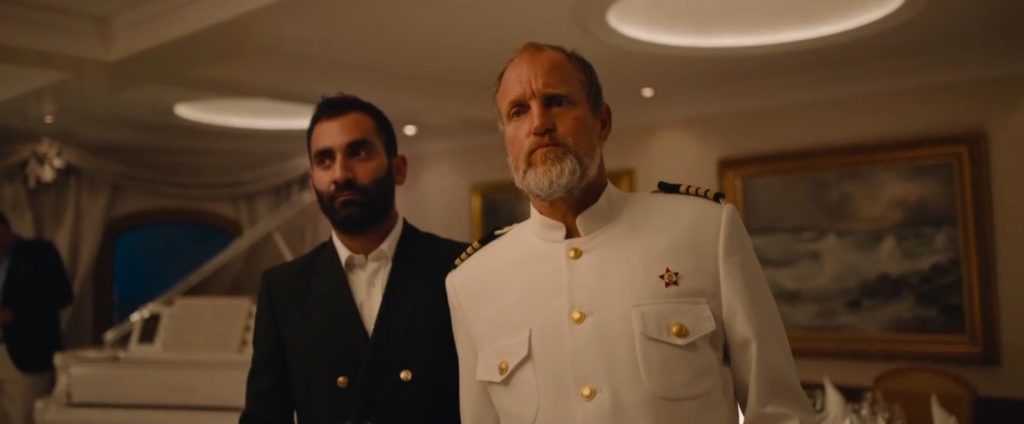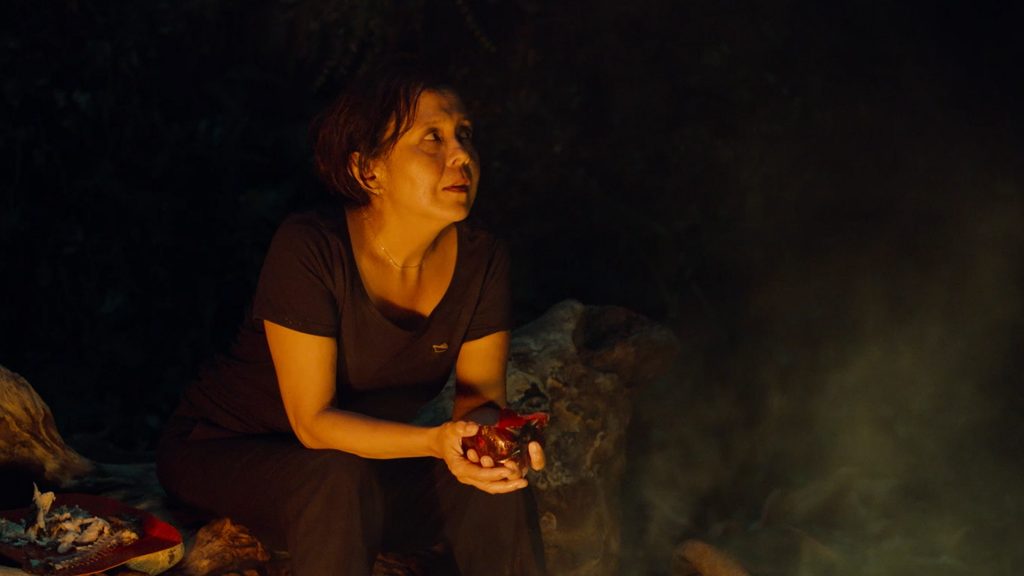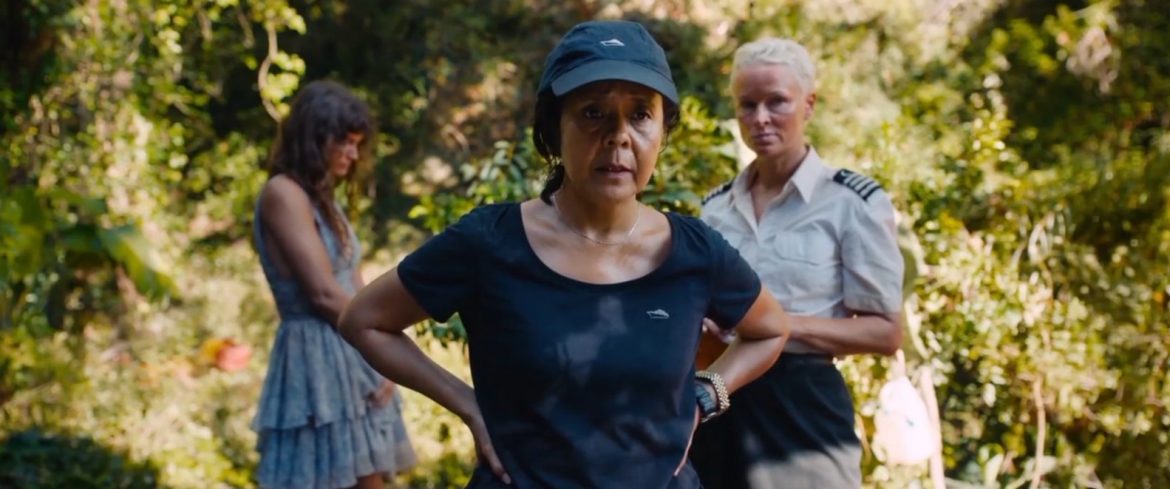There is nothing new with Ruben Östlund’s latest black comedy, anti-one percent film Triangle of Sadness and that has been the main concern of some critics about the film. With the rise of anti-capitalist films and TV series lately, the latest Palme d’Or winner is a critique of capitalism and praxis of liberal politics formed by college freshmen who felt like they finally woke up from their societal slumber after attending two classes of their humanities course. However, Östlund is not here to bring something new to the table as he focused on making the audience rambunctiously laugh at the naiveness, stupidity, and demise of the elites.

The almost-three hour satirical film can be on the nose when it comes to its theme of ridiculing the megarich’s lifestyle: suggesting botox to fix the triangle of sadness or the furrowed area between the brows, models changing their poses and facial expressions depending on the brand, and a helicopter flying to a yacht in the middle of the ocean just to drop a briefcase of Nutella jars. These are on top of the over-the-top requests of the passengers like a woman who kept on complaining about the dirty sails of the yacht (there are no sails) and a middle-aged white blonde woman (Vera, played by Sunny Melles) demanding all crew members of the yacht to leave their tasks and swim just so they get to experience the beauty of life; Never mind if they still have docks to clean and food to cook, they were told to eat the cake by their Marie Antoinette. The term “no” is not part of the crew’s dictionary when it comes to the requests of their passengers. Their head Paula (Vicki Berlin) instilled in them the “customers are always right” mindset in hopes, with a capital H, that passengers will give them a big, fat tip.
Östlund portrayed the naivety and insensitivity of the powerful and untouchable one percent as bafflingly hilarious. But Östlund, the mind behind the satires The Square and Force Majeure, knows the reality is far from the caricatures formed by leftists. The one percent, the culprit of probably 99 percent of the world’s issues, are harmless when one has a chance to interact with them on the yacht. Dimitry (Zlatko Burić), the self-declared “King of Shit” who exploited the downfall of the Soviet Union for his fertilizer business, is a funny, happy-go-lucky man. Jarmo, a tech millionaire, teared up after he experienced companionship. The elderly, meek couple Winston (Oliver Ford Davies) and Clementine (Amanda Walker) made fortune from manufacturing weapons, describing them as products that “upheld” democracy all over the world. Is Östlund humanizing these capitalist pigs? I don’t think so. Östlund is reminding us that the people who strengthen the capitalist system can be kind, endearing, understanding, and relatable to some extent.
When the guests started to vomit from seasickness, the continuous swaying of the yacht due to a storm, and a *literal* shitstorm, their frantic screams and panic caused hysterical laughter. How are they going to survive this misery? Boo hoo for them. Really, why should we care? Triangle of Sadness encourages everyone to laugh at the misery of these people. The grotesque toilet humor is seen as a lazy way to pull a joke in comedy films but seeing the elites get hit by a flood of feces is the best usage of the trope since Bridesmaids.
Triangle of Sadness showcases the strength and wit of those who were not blessed with a sea of gold coins hidden in their vault. The film initially focused on couple Carl (Harris Dickinson) and Yaya (the late Charlbi Dean, who unfortunately passed away after the film’s premiere). One might confuse these English models as being part of the film’s main target but they are still part of the bottom feeders. But unlike the Southeast Asian crew members in the yacht, Carl and Yaya have a different set of currency to purchase the crumbs of the affluents’ perks. They fight over the restaurant bill, Carl complains how male models make less money compared to their female counterparts, Yaya slaps him with her concern about female models having no job security once they get pregnant. On top of that, the couple only got free access to the yacht in exchange for Yaya feeding her Instagram followers with a glimpse of the lifestyle of the rich and famous. Their looks complying with the Western standard of beauty are enough for them to taste the caviars.
Östlund tried to touch on gender politics between the two. Aside from the gender wage gap in the modeling industry, the film assessed choice feminism and the idea of representation under the liberal lens. Carl feels Yaya’s aspiration of being a “trophy wife” is shallow and demeaning but what’s wrong with women having a conscious choice of financial security while staying at home? Later in the film, it seemed that Carl ate his words when Filipina toilet manager Abigail (Dolly de Leon) became their new leader. Yaya also easily submitted herself to Abigail as she is a woman in power, a position she wants to obtain with her Eurocentric looks.

But Abigail is more than just a representation of female empowerment. Her skills in cleaning, fishing, and starting a fire with wood catapulted her as the captain of the ship. Aside from what is written in the screenplay, Abigail can command everyone because De Leon seizes every moment she’s on the big screen. With her thick Filipino accent and mannerisms like putting her hands on her hips while speaking, referring Paula as “ma’am” despite the crew head’s demotion in their own social hierarchy, and calling Carl a “cutie pie”, De Leon proudly establishes her nationality, reclaiming the power of Filipino traits that are usually portrayed as signs of weakness.
The last scene, the most powerful in the whole film, tests its audience about socioeconomic power. I won’t spoil too much but it features the conflict of two classes trying to climb their way out of the barrel. A dilemma was brewing in the head of one of the characters: Should we understand the people who are just trying to survive the world governed by the one percent or should we be merciless in destroying anything that contributes to the growing power of capitalism?
Triangle of Sadness’ limited screening in the Philippines will start on Nov. 30. Prior to this, the film was screened at the 10th QCinema International Film Festival.



